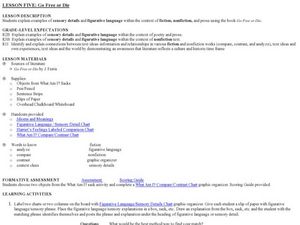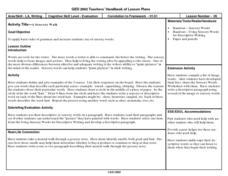Curated OER
"Snapshot" Exercises & Sensory Detail Word Bank
Read a sample of creative descriptive writing to your science class. Discuss how writing can be used to record and communicate observations that scientists make. Reading selections and thought-provoking questions are suggested. Also...
Curated OER
Lesson Plan: Sensory Exploration
Using their keen eyes and ears, learners build story observation skills which they will use to create sensory detail in their art. They note all of the things they observed on a walk, categorize them by sense, and then use the same skill...
Roald Dahl
Charlie and the Chocolate Factory
You can't read Roald Dahl's Charlie and the Chocolate Factory without craving the rich treats described in Dahl's vivid prose. Young writers try their hands at sensory language with a lesson plan that prompts them to write about their...
Houghton Mifflin Harcourt
Look at Us!: English Language Development Lessons (Theme 1)
Start off your young English language learners with this packet of materials, which covers three weeks of instructions. After completing the unit, kids will have practiced the letters K through Z, read several story books, talked with...
Curated OER
Setting the Tone with Figurative Language
Explore figurative language with your secondary class. Extending a language arts unit, the lesson plan prompts middle schoolers to examine how an author's word choice establishes a story's tone, possibly using metaphors, similes,...
EngageNY
Writing to Show, Not Tell: Dialogue, Sensory Words, and Strong Action Verbs
Consume, gobble, devour ... serving up strong verbs! Writers focus on using dialogue, strong action verbs, and sensory details in their writing. After analyzing a model narrative, they apply their learning to their own hero's journey...
Curated OER
Poetry Writing Unit: Writing a Film Poem
Film poems? To concluded a poetry unit, writers select one of their own poems and create a film that brings to life the sounds and images of their work. Included with the detailed unit plan are daily lessons, student examples, a list of...
Curated OER
Setting Worksheet
Set your class up for success with writing descriptive settings with these two graphic organizers. On the first page, writers note specifc details about their chosen setting and comment on how each character views the setting. The second...
Curated OER
A Seashell Lesson: Writing for Detail and the Scientific Process
Practice descriptive language in this lesson, which prompts elementary and middle schoolers to write detailed descriptive sentences describing a seashell. They write a description of a shell, create an illustration, and other students...
Curated OER
Language Arts: Telling a Painting's Story
Use art museum paintings as inspiration for your class's creative writing works. Observing the paintings closely, middle and high schoolers list details and write descriptions. Their completed stories are displayed on bulletin boards...
Curated OER
Let's Go Exploring!
Use a Courbet painting of a cave or tunnel opening to reinforce the importance of descriptive writing. Writers of all ages use sensory details to describe what the scene depicts as they pretend to be in the painting. Then they imagine...
Curated OER
The Sound of…Poetry!
Scritch, scratch, scritch. It's the sound of pupils writing poetry! Focus on sensory language and onomatopoeia with a writing lesson plan. After listening to some sounds, learners examine a couple of poems that include sound words and...
Curated OER
Logs, Charts, and Journals: What's On Your Plate?
Have your writers identify and use words that appeal to the senses. They create a chart of sensory words and record some of their favorites, then write a journal entry in which they describe eating at a restaurant using sensory details....
Scholastic
Comprehension During Independent Reading
Ideal for a language arts class, literary unit, or independent reading assignment, a set of reading worksheets address a wide array of skills. From poetic elements to nonfiction text features, you can surely find a valuable resource in...
Read Works
The Language of Setting
Descriptive language can be used to create a vivid and imaginative setting. Create the chart suggested in this plan to track the descriptive language found in The Wizard of Oz by L. Frank Baum. The class discusses the land beyond...
Curated OER
Go Free or Die: Figurative Language
Figures of speech, sensory details, and academic language are all targeted while reading Chapter Two of J. Ferris’ Go Free or Die. First, learners engage in an exercise to practice describing with detail. Then, partners use a chart to...
Curated OER
The Old Man and the Sea: Guided Imagery
What do you imagine when you think of the sea? Put on some ocean sounds, close your eyes, and listen to a guided meditation based on the imagery from The Old Man and the Sea by Ernest Hemingway. After class members listen to the...
Pearson
Catching the Sun: Tales from Asia
Explore the folklore of Asia and the South Pacific with this language arts lesson series. Complementing a reading of Catching the Sun: Tales from Asia by Jan M. Mike, this resource supports learners with understanding cause and effect...
K20 LEARN
Brushstrokes: Communication/Using Descriptive Language
Sometimes a picture reflects a thousand descriptive words. To illustrate the importance of sensory words in descriptive writing, scholars listen to a song and craft a painting in response. After sharing their work with the class,...
Teachers.net
Figurative Language
When is a staple remover a fanged monster? In your ELA classroom when you're teaching this fun figurative language instructional activity, of course! Get your young writers using figurative language by making a game of it. Give groups a...
Curated OER
A Sensory Walk
Students define and give examples of five senses, compiling a list of sensory words to be used in a written descriptive paragraph.
Curated OER
Go Free or Die
Groups of older elementary learners begin their study of figurative language by visiting a website and completing the exercises detailed there. They then apply what they have learned by finding examples in several poems. Finally, they...
Novelinks
Walk Two Moons: Guided Imagery
Sensory details can enhance the reading experience, especially during a guided imagery reading. Young readers close their eyes and listen to a passage from Sharon Creech's Walk Two Moons before responding to discussion questions and...
Novelinks
Tuck Everlasting: Similes, Metaphors, and Personification in Imagery
Poetic language is abundant in Natalie Babbitt's beautiful novel, Tuck Everlasting. Learners note the examples of similes, metaphors, and personification they find as they read, and illustrate how the language creates a sensory...

























